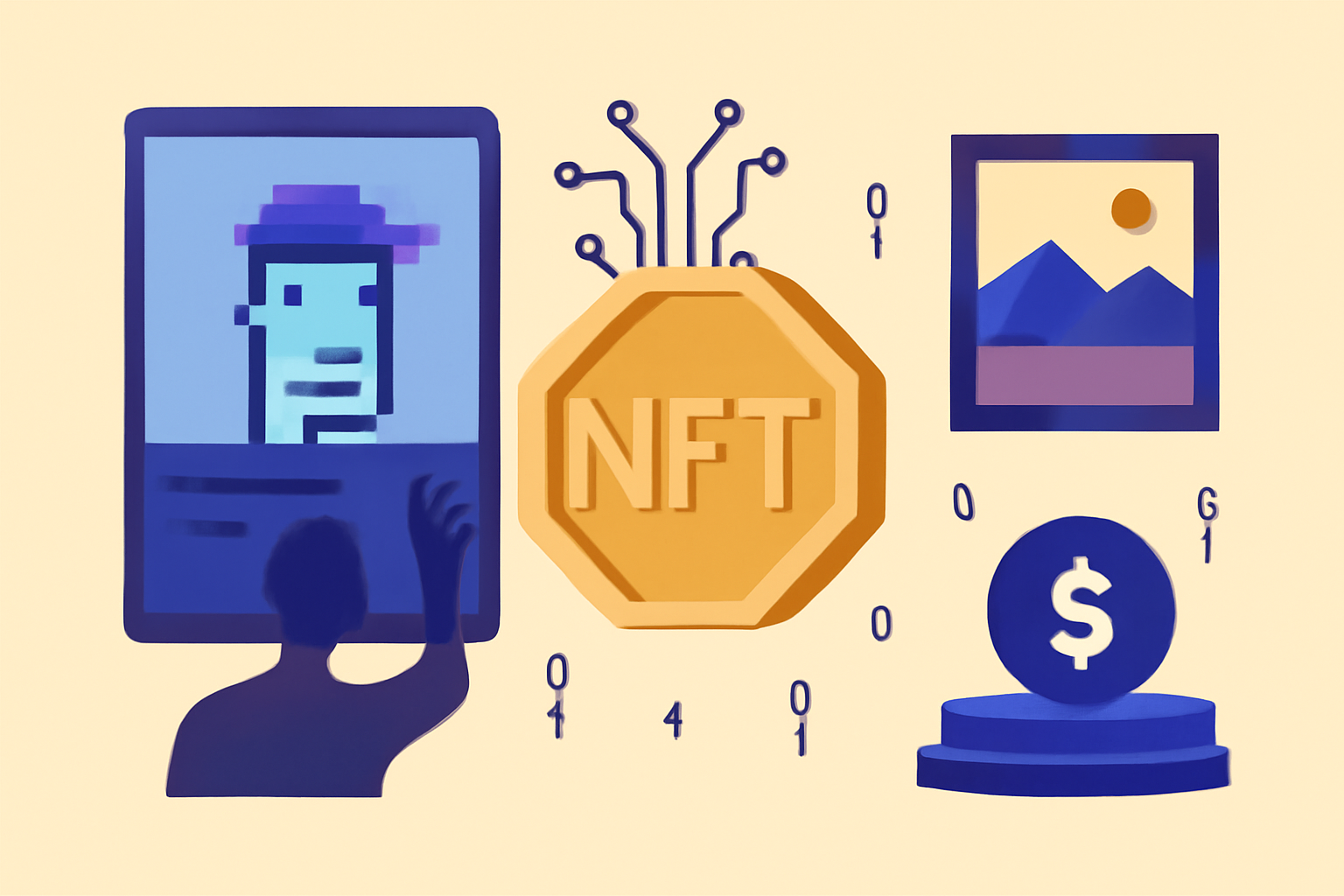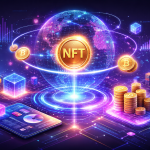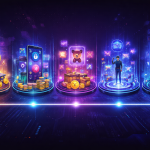NFT & Blockchain
The Rise Of NFTs And The Shift In Digital Ownership

Introduction
The advent of Non-Fungible Tokens (NFTs) has significantly transformed the digital landscape in recent years. These blockchain-based tokens have redefined how ownership is perceived and recorded in the digital world. Unlike cryptocurrencies such as Bitcoin, which are interchangeable, NFTs are unique digital assets that represent ownership of specific items, whether they be digital art, music, video clips, or even virtual real estate. With their popularity skyrocketing, NFTs have not only disrupted the art and entertainment industries but also introduced profound changes in how we manage and transfer digital ownership.
At the heart of this revolution lies digital ownership, the concept of having verifiable, tamper-proof ownership rights over digital goods. Traditional ownership models in the digital world have often been murky. For instance, purchasing a digital file like an image or a song didn’t grant the buyer true ownership of the file’s rights. Instead, users were typically buying licenses to use those files under certain conditions. NFTs, however, have changed this dynamic by allowing individuals to own, buy, and sell unique digital assets in a way that’s verifiable and secure through blockchain technology.
Understanding NFTs And Their Role In Digital Ownership
What Are NFTs?
To better understand the role of NFTs in digital ownership, it’s important to first grasp what NFTs are. At their core, NFTs are unique digital tokens created on a blockchain, typically Ethereum. Unlike other digital tokens or cryptocurrencies, which are interchangeable, NFTs are one-of-a-kind and cannot be replaced with an identical item. This uniqueness is what gives NFTs value.
NFTs can represent anything from art, music, and videos to digital land in virtual worlds and collectibles. The ownership of an NFT is recorded on the blockchain, providing a transparent, tamper-proof ledger that verifies who owns the asset.
What sets NFTs apart from traditional digital assets is their ability to provide verifiable proof of ownership, something that was previously missing in the digital world. A person who owns an NFT holds the rights to the asset associated with it, whether it’s a piece of digital art or a collectible card. This ownership is recorded permanently on the blockchain and can be easily transferred from one user to another, creating a new way to buy, sell, and trade digital goods.
The Impact Of NFTs On Decentralized Finance (DeFi)
NFTs as Financial Assets in DeFi
One of the most exciting aspects of NFTs is their integration with Decentralized Finance (DeFi). DeFi refers to a system of financial applications built on blockchain technology that operates without central intermediaries like banks or brokers. NFTs, traditionally thought of as digital collectibles, are now finding their place in this new financial ecosystem.
NFTs can be used as collateral for loans, making them valuable financial assets within the DeFi space. For example, platforms like NFTfi allow NFT holders to use their assets as collateral for loans, essentially allowing them to unlock liquidity without having to sell their NFTs. This is a major step forward for NFT holders, as it gives them more flexibility in how they manage their assets.
The integration of NFTs into DeFi also brings new opportunities for liquidity pools and yield farming. Liquidity pools, typically used in traditional financial markets, allow users to pool their assets together and earn rewards. NFTs can now be integrated into these pools, enabling users to earn yields based on their NFT holdings. This offers NFT holders a new way to monetize their assets and participate in the broader DeFi ecosystem.
Additionally, the introduction of NFT staking has further expanded the role of NFTs in DeFi. Staking involves locking up assets in a smart contract to earn rewards, and NFT staking is gaining traction as a way to earn passive income from NFT holdings. By staking NFTs, holders can earn rewards or even access exclusive content and benefits within certain platforms or communities.
NFTs And The Evolution Of Creator Rights Management
Empowering Creators with NFTs
Beyond their role as financial assets, NFTs are also playing a pivotal role in empowering creators. One of the most exciting aspects of NFTs is their ability to revolutionize how creators manage their intellectual property and monetize their work. Traditionally, creators in industries like art, music, and film have struggled with controlling and profiting from their digital creations due to issues like piracy and the ease of copying digital files.
NFTs provide a solution to these challenges by enabling creators to tokenize their work and retain control over their intellectual property. When an artist or musician creates an NFT, they are able to sell it directly to consumers without the need for intermediaries like galleries, record labels, or streaming platforms. This direct-to-consumer model allows creators to keep a larger portion of the revenue generated from their work.
Moreover, NFTs also offer creators the ability to embed royalties directly into their tokens. This means that whenever an NFT is resold, the creator can automatically receive a percentage of the sale price. This ongoing revenue stream is a game-changer for artists, as it ensures they continue to benefit financially from the increasing value of their work, even after it changes hands.
NFTs also offer proof of authenticity, which is particularly important in the world of digital art. Artists can use NFTs to prove that their digital artwork is original, which helps protect against piracy and counterfeit works. This verification system ensures that buyers are purchasing legitimate, high-quality digital art and provides artists with the recognition they deserve.
NFT Market Predictions For The Next Five Years
The Continued Growth of NFTs
Looking forward, the NFT market is poised for continued growth. While the market may have experienced periods of volatility, its fundamental value proposition remains strong. NFTs have the potential to revolutionize not only the art and entertainment industries but also other sectors such as real estate, gaming, and virtual experiences.
Over the next five years, we can expect to see further adoption of NFTs across a wide range of industries. For example, the real estate sector has already begun experimenting with NFTs to represent ownership of virtual properties, and this trend is likely to expand into the physical world as well. Virtual worlds like Decentraland and The Sandbox have shown how NFTs can be used to represent virtual land, and this concept is expected to expand into other areas of online interaction.
Similarly, NFTs will continue to disrupt the gaming industry, allowing players to truly own in-game assets, characters, and skins. This creates a new model for game developers and players, where players can trade, sell, or use their in-game assets outside of the games themselves.
Moreover, NFTs will increasingly be integrated into loyalty programs and reward systems for brands. Companies may use NFTs to offer exclusive access to products, services, or experiences, providing a unique way to engage with their customers.
NFTs And Increased Regulation
As the NFT market grows, so too will the scrutiny and regulation around it. Governments and financial institutions are beginning to take a closer look at NFTs, particularly in relation to tax implications and the potential for money laundering. In the coming years, we can expect to see clearer regulations surrounding NFTs, especially as they become more intertwined with DeFi platforms and other financial products.
This regulatory clarity will likely lead to greater mainstream adoption of NFTs, as businesses and individuals will have a clearer understanding of how to interact with and invest in these digital assets. However, regulation may also lead to new challenges, particularly in terms of ensuring that NFTs are used ethically and that creators’ rights are protected.
Conclusion
NFTs represent a monumental shift in the way we think about ownership and value in the digital world. By providing a secure, transparent way to prove ownership of digital assets, NFTs are revolutionizing industries ranging from art and entertainment to gaming and real estate. In the coming years, the integration of NFTs into Decentralized Finance and creator rights management will continue to expand, offering new opportunities for financial empowerment and creative control.
As we move forward, the NFT market will undoubtedly face challenges, including regulatory hurdles and the need for greater consumer education. However, the potential for NFTs to reshape the digital economy and empower creators is immense. With continued innovation and adoption, NFTs will play an integral role in the future of digital ownership.











